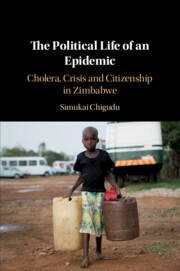Crossref Citations
This Book has been
cited by the following publications. This list is generated based on data provided by Crossref.
Parker, Melissa
MacGregor, Hayley
and
Akello, Grace
2020.
COVID-19, Public Authority and Enforcement.
Medical Anthropology,
Vol. 39,
Issue. 8,
p.
666.
Power, Amanda
Peša, Iva
and
Honda, Eiko
2020.
Undoing the Discipline: History in the Time of Climate Crisis and COVID-19.
Journal for the History of Environment and Society,
Vol. 5,
Issue. ,
p.
33.
Bashizi, Anuarite
Ansoms, An
Ndayikengurutse, Guillaume
Amani, Romuald Adili
Akilimali, Joel Baraka
Chiza, Christian
Karangwa, Innocent
Mobali, Laurianne
Mudinga, Emery Mushagalusa
Mutabesha, David
Niyonkuru, René-Claude
Nsabimana, Joseph
Bisoka, Aymar Nyenyezi
and
Piccoli, Emmanuelle
2021.
Real governance of the COVID-19 crisis in the Great Lakes region of Africa.
Journal of Eastern African Studies,
Vol. 15,
Issue. 2,
p.
190.
Charters, Erica
and
Heitman, Kristin
2021.
How epidemics end.
Centaurus,
Vol. 63,
Issue. 1,
p.
210.
Dixon, Justin
MacPherson, Eleanor Elizabeth
Nayiga, Susan
Manyau, Salome
Nabirye, Christine
Kayendeke, Miriam
Sanudi, Esnart
Nkaombe, Alex
Mareke, Portia
Sitole, Kenny
de Lima Hutchison, Coll
Bradley, John
Yeung, Shunmay
Ferrand, Rashida Abbas
Lal, Sham
Roberts, Chrissy
Green, Edward
Denyer Willis, Laurie
Staedke, Sarah G
and
Chandler, Clare I R
2021.
Antibiotic stories: a mixed-methods, multi-country analysis of household antibiotic use in Malawi, Uganda and Zimbabwe.
BMJ Global Health,
Vol. 6,
Issue. 11,
p.
e006920.
Altschuler, Sari
and
Maddock Dillon, Elizabeth
2021.
Humanities in the Time of Covid: The Humanities Coronavirus Syllabus.
ISLE: Interdisciplinary Studies in Literature and Environment,
Vol. 27,
Issue. 4,
p.
836.
Makombe, Eric Kushinga
2021.
“Between a Rock and a Hard Place”: The Coronavirus, Livelihoods, and Socioeconomic Upheaval in Harare’s High-Density Areas of Zimbabwe.
Journal of Developing Societies,
Vol. 37,
Issue. 3,
p.
275.
Azmat, Syed Khurram
Ali, Moazzam
Siddiqui, Fahad Javaid
Tirmizi, Syed Farhan Ali
Kiarie, James
and
Char, Arundhati
2021.
Scoping Review on the Impact of Outbreaks on Sexual and Reproductive Health Services: Proposed Frameworks for Pre-, Intra-, and Postoutbreak Situations.
BioMed Research International,
Vol. 2021,
Issue. ,
p.
1.
Bethlehem, Louise
2022.
Hydrocolonial Johannesburg.
Interventions,
Vol. 24,
Issue. 3,
p.
340.
Leach, Melissa
MacGregor, Hayley
Ripoll, Santiago
Scoones, Ian
and
Wilkinson, Annie
2022.
Rethinking disease preparedness: incertitude and the politics of knowledge.
Critical Public Health,
Vol. 32,
Issue. 1,
p.
82.
Cheeseman, Nic
2022.
(Mis)Understanding Urban Africa: Toward A Research Agenda on the Political Impact of Urbanization.
African Studies Review,
Vol. 65,
Issue. 4,
p.
985.
Bwerinofa, Iyleen Judy
Mahenehene, Jacob
Manaka, Makiwa
Mulotshwa, Bulisiwe
Murimbarimba, Felix
Mutoko, Moses
Sarayi, Vincent
and
Scoones, Ian
2022.
What is ‘community resilience’? Responding to COVID-19 in rural Zimbabwe.
BMJ Global Health,
Vol. 7,
Issue. 9,
p.
e009528.
Vanyoro, Kudakwashe
2022.
‘This place is a bus stop’: Temporalities of Zimbabwean migrant men waiting at a Zimbabwe-South Africa border transit shelter.
Incarceration,
Vol. 3,
Issue. 1,
p.
263266632210845.
Charters, Erica
2022.
Information, Expertise, and Authority: The Many Ends of Epidemics.
Centaurus,
Vol. 64,
Issue. 1,
p.
15.
Zvokuomba, Kwashirai
and
Marunza, Dean Masimba
2022.
Governance Challenges During the COVID-19 Pandemic in Africa.
p.
195.
Platzky Miller, Josh
Sander, Antoine
and
Srinivasan, Sharath
2022.
Control, Extract, Legitimate: COVID‐19 and Digital Techno‐opportunism across Africa.
Development and Change,
Vol. 53,
Issue. 6,
p.
1283.
Mhazo, Alison T
and
Maponga, Charles Chiedza
2022.
Beyond political will: unpacking the drivers of (non) health reforms in sub-Saharan Africa.
BMJ Global Health,
Vol. 7,
Issue. 12,
p.
e010228.
Dionne, Kim Yi
and
Harris, Joseph
2023.
Shifting Ground Beneath our Feet: New Research in the Political Science and Sociology of Global Health and its Significance.
Studies in Comparative International Development,
Vol. 58,
Issue. 3,
p.
309.
Shabani, Takunda
and
Jerie, Steven
2023.
A review of the applicability of Environmental Management Systems in waste management in the medical sector of Zimbabwe.
Environmental Monitoring and Assessment,
Vol. 195,
Issue. 6,
Ermus, Cindy
2023.
Urban Disasters.





